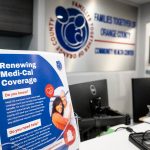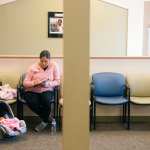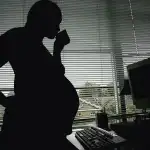India D., 28, knows something is wrong with her body. She’s just not sure what.
She feels fatigued constantly. When it’s too cold, her fingers and toes turn white, and she can’t form a grip. Her joints often ache. She suspects it’s an autoimmune disorder.
Her menstrual cycle is marked by almost two weeks of severe pain that leaves her incapacitated for days. She believes she — like her mother before her — may suffer from endometriosis.
But she can’t confirm either, because seeing a doctor to get a diagnosis isn’t possible. She doesn’t have health insurance. She hasn’t for two years.
Before the COVID-19 crisis, India, whose full name has been withheld for privacy reasons, worked at a local restaurant where she made $9 per hour. She couldn’t work full time — she’s also the principal caregiver for her mother, who has a disability. The restaurant job didn’t provide health insurance, and she made too little to get government help buying private coverage.
Because she lives in North Carolina, she had no other options available. Through the Affordable Care Act, states have the option to expand eligibility for Medicaid, the government health plan for low-income people, so that it covers adults like her. But North Carolina hasn’t done it.
“It’s frustrating. It’s maddening. It’s disheartening and depressing, really,” India said. “Because it doesn’t have to be this way. It just doesn’t.”
India lost her job in March 2020. Soon after, the restaurant closed down. She still can’t find work or affordable health insurance. Though she’s vaccinated against COVID-19, most people in her county are not. And the prospect of falling sick, especially without coverage, terrifies her.
She falls into one of the ACA’s most glaring coverage holes: the so-called Medicaid “coverage gap,” which appears to disproportionately harm women workers, per data shared with The 19th.
As written, the 2010 health law would have dramatically expanded who is eligible for Medicaid, so that almost any adult earning up to 138 percent of the federal poverty level — $17,774 for an individual in 2021, or $24,040 for a family of two — could qualify. Adults earning more than that would get tax breaks to help them purchase private insurance.
But that’s not what happened in practice. In a 2012 ruling, the Supreme Court gave states, which operate their own Medicaid programs using federal funding, the option to decline the expansion. A dozen states, including North Carolina, remain holdouts.
The coverage gap has left about 2.2 million Americans uninsured, according to the nonpartisan Kaiser Family Foundation (KFF). They earn too much to qualify for Medicaid, but don’t earn enough to qualify for subsidized private insurance. Another 1.8 million uninsured people could be eligible for subsidized marketplace plans, but would also qualify for Medicaid — which is free — if their states expanded eligibility.
If India lived even one state further north, in Virginia, she’d likely have coverage.
“I have to calculate each month my expenses and set money aside in case I have to make an emergency trip to a doctor,” she said. “And to not have to do that each month would be a blessing.”
So for now, she saves where she can — buying cheaper groceries, holding off on purchasing any new clothes, living rent-free with her parents — just in case she has an emergency.
Congressional Democrats and President Joe Biden have vowed to find a path to convince the last 12 states — Alabama, Florida, Georgia, Kansas, Mississippi, Missouri, North Carolina, South Carolina, South Dakota, Tennessee, Texas and Wyoming — to expand eligibility or directly extend affordable insurance options to their residents. Biden’s COVID-19 relief package, the American Rescue Plan, offered more federal money to states that opted into the expansion.
But so far, no holdout state has budged. All but Kansas and North Carolina are headed by Republican governors, who have consistently refused to opt in — and in Kansas and North Carolina, Republican-controlled legislatures have shown similar resistance. Barring a dramatic shift in state politics, observers believe that change is most likely if spearheaded by the federal government.
Neither Biden’s fraught infrastructure bill nor his American Families Plan includes a fix for Medicaid expansion or a different proposal to extend coverage to the uninsured. Democrats have put forth various bills, some proposing to give states more federal funding if they opt in, others suggesting individual counties bypass states to adopt the expansion. But no proposal has a clear path to becoming law. Policymakers and analysts say that solving the Medicaid expansion conundrum remains one of Washington’s biggest health policy challenges.
Meanwhile, women like India remain in limbo.
Data from the Georgetown University Center for Children and Families analyzed for The 19th suggests that if all 12 states expanded eligibility, women would make up the majority of workers who benefit.
In states that did not expand eligibility, about 52 percent of low-income uninsured citizens with some connection to the labor market are women, the data shows. In Alabama, Kansas, Georgia, Mississippi, Missouri, North Carolina and Texas, the majority of low-income uninsured citizens are women. The data, which was collected in 2019, does not account for nonbinary people.
Those numbers offer a glimpse of the impact Medicaid expansion could have for women in particular, said Rachel Garfield, a Medicaid policy expert at KFF, which was not involved in the analysis.
In fact, the data might underestimate just how many women would be affected. Because the information predates 2020, neither the Georgetown data nor separate Medicaid analyses from KFF factor in the impact of COVID, which from an economic standpoint disproportionately harmed Black women and Latinas. Experts are not sure how many of those women who lost jobs or income also lost the ability to pay for health coverage.
Women typically earn less and are less likely to work in jobs that have health benefits. That’s especially true in several of the larger states that have not opted into the Medicaid expansion, such as Texas and Georgia — which have the largest and third-largest uninsured counts in the country. (Florida is in between.)
“If you just look at the gender distribution of people in poverty, or you look at the rate of poverty by sex, you can see that — because of differences in pay, and all sorts of historical reasons — women are more likely to be living in poverty,” Garfield said. “That’s going to just disproportionately put more women in that pool of people” who might qualify for expanded Medicaid.
Some uninsured women may already qualify and not realize it. Parents or pregnant people with very low incomes — two groups that most often include women — can sometimes enroll in Medicaid even in states that did not adopt the expansion. States that have expanded Medicaid have often seen those already-eligible people gain coverage thanks to increased awareness and publicity surrounding Medicaid enrollment.
In the states where a majority of the uninsured are women, the number who are already eligible but still lack coverage is likely a minority, according to Joan Alker, executive director of the Georgetown University Center for Children and Families and an expert in Medicaid policy.
Most of those people are typically parents, often single mothers. But individual states can determine the income threshold for parents to qualify for Medicaid. And the states that have both declined the expansion and that have larger percentages of uninsured women allow for very few parents to enroll in Medicaid.
In Texas, where 55 percent of low-income uninsured citizens are women, parents must earn no more than 17 percent of the federal poverty level — less than $3,000 per year for a family of two — to qualify. In Mississippi, where 54 percent are women, the cutoff is 25 percent of the federal poverty level, or less than $4,400 per year.
The fact that those states have high shares of uninsured women isn’t a coincidence, Alker added.
“It probably reflects the fact that those states have some of the lowest Medicaid eligibility levels for parents. It probably also reflects the structure of their labor market, where women tend to be clustered in jobs that don’t have health insurance,” she said.
That’s the reality for Trish Monday, a 34-year-old single mother in Canyon Lake, Texas. Before the COVID health emergency, Monday worked as a certified nurse assistant making $10 an hour. But because Monday couldn’t consistently work 40 hours a week, she was never eligible for her employer’s health benefit.
Monday hasn’t had health insurance for at least 13 years, she said. She’s looked at marketplace plans, but without a subsidy, it simply isn’t affordable. The only plan remotely in her price range came with a $6,000 deductible, meaning she’d have to exhaust her savings before the health benefit even kicked in. Her 12-year-old son does qualify for Medicaid.
Monday and her son both have a blood disorder that weakens their immune systems. For her own health needs, Monday waits until she can’t anymore — then she goes to the emergency room. Every time she goes, she said, nurses ask why she didn’t come sooner.
She’s negotiated financial assistance for some of the bills and cuts expenses where she can. Monday doesn’t remember the last time she bought herself new bras. But medical debts have piled up on her credit card. She doesn’t know when or how she can pay them back.
The worst part, Monday said, is knowing it doesn’t have to be this way — that if she lived somewhere else, it wouldn’t.
“If I lived in Colorado, or lived in New York or New Jersey, I would qualify for Medicaid,” she said. “But in the southern states, we don’t qualify. We’re in this limbo mess because these states refuse to have any compassion for human beings. They don’t care.”
In spring 2020, her son’s school closed down, and Monday couldn’t find child care. She tried to rearrange her hours at work, she said, but instead was taken off the schedule. She’s been without work since, but the circumstances of her departure prevented her from qualifying for unemployment.
She and her son have been living off her stimulus checks, savings and tax refunds for the past year — a total of about $7,000, she estimates. But the money is running out.
This fall, when Monday’s son goes back to school, she hopes to find better-paying work as a school bus driver, or perhaps at Amazon or Walmart. She hopes the job will provide a health benefit, too — one she can afford, where the deductible isn’t as big as her bank account. But she doesn’t know if it will, or if she’ll finally make enough money to qualify for subsidized insurance.
She wishes things were simpler.
“If they would just expand Medicaid, it would make people’s lives so much easier,” she said. “At the Texas level, at the federal level — it’s got to be fixed.”






